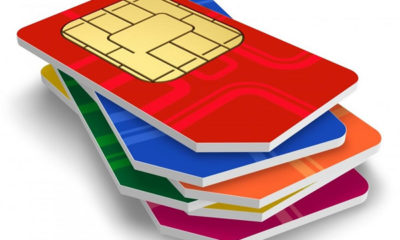- Costly Smartphones, Low Investment Frustrate Nigeria’s 4G Drive
The efforts of telecom operators to offer Nigerians fast Internet connectivity via 4G network is being hindered by multiple challenges, IFE OGUNFUWA examines them
The adoption of fourth generation of mobile network technology, 4G, by Nigerians has faced many challenges prominent among them are low investment in the technology and costly 4G-enabled smartphones.
The 4G Long Term Evolution technology offers ten times download speed over the third generation of wireless mobile communications, 3G; has low latency and supports services such as high-definition videos streaming, video calls, fast downloads, seamless file transfer, data centres and cloud services, among others.
MTN launched the 4G LTE in Lagos, Abuja and Port Harcourt in 2016 and has expanded to other parts of the country. The same year, 9mobile (former Etisalat) launched the technology in six states with its 4G-enabled SIM cards; Airtel rolled out its 4G services this year in 60 cities while Globacom says it has 4G LTE coverage in all the 36 states and 208 tertiary institutions.
Despite these claims of extensive 4G presence in all parts of the country, a GSMA report released in November 2018 stated that Nigeria had slow 4G growth as only four per cent of connections are driven by 4G compared with other regional countries.
“Currently, only 44 per cent of mobile subscribers in Nigeria are using 3G technology and 4 per cent are using 4G technology, compared to over 18 per cent 4G penetration in South Africa and 16 per cent in Angola,” the report stated.
Speaking with our correspondent on factors responsible for the slow adoption of 4G, the Head of Sub-Saharan Africa, GSMA, Mr. Akinwale Goodluck, said regulatory environment, weak currency and insufficient spectrum especially in the sub-1GHz band, were not encouraging massive investment in telecom infrastructure.
He added that there was still insufficient locally-relevant content to drive demand for high-speed 4G broadband services among the majority of phone users in the country.
“Impact of regulatory and macroeconomic developments on capital investments – regulatory pressure, hard-line oversight by regulatory agencies and macroeconomic factors, such as currency weakness and the recession in 2016, have had a negative impact on investor confidence and the ability of mobile operators to raise the required capital for large-scale infrastructure projects,” he said.
In particular, the President, Association of Telecommunications Company of Nigeria, Mr Olusola Teniola, said the expensive right of way, multiple taxes and forex scarcity were creating bottlenecks for operators to expand broadband infrastructure across the country.
According to him, access to forex to import equipment for base stations and towers from other countries is difficult as the government has not prioritised forex to telecoms industry.
“In terms of 4G in Nigeria, the situation we find ourselves in is that over the last eighteen months, there hasn’t been any significant investment in rolling out networks, including 4G,” Teniola said.
He added, “What we have seen is that the government has actually not improved the ease of doing business and has actually made the situation worse. We have to understand that investors are nervous as to how government sees telecoms and its ability to improve the economic situation of the country.”
“We have a lot of 2G networks in the country and the penetration has increased to over 100 per cent. However, for high-speed data services, we need to upgrade the networks from 2G to 3G and 4G. There needs to be a relevant demand before service providers will install high-capacity networks such as 4G,” ATCON president added.
The Head of Technical Standards and Network Integrity, Nigerian communications Commission, Bako Wakli, identified the high cost of 4G- enabled phones and their incompatibility with the frequency of the 4G LTE networks in the country as major factors limiting 4G connectivity.
He also stated that some Nigerians are contented with the connectivity 2G offered even though network operators have intensified effort to encourage consumers to upgrade their SIM cards.
“What is affecting Ntel as a full 4G operator is the issue of device. Today, 4G is operated in over 40 sub-bands and we have not found devices operating in the bands; and they are much more expensive. The issue of device is very critical and and we need to find a way to address this,” he said.
A market research by our correspondent showed that many 4G-enabled smartphones are quite expensive for an average Nigerian, ranging from N40,000 to over N200,000.
Further findings showed that the “high-speed browsing experience” that network operators have promised Nigerians have not materialised as data from Ookla Speedtest Index showed a mobile download speed of 11.58 and upload speed of 5.06 Mbps, for Nigeria in October.
In order to improve 4G adoption in the country, Goodluck advised the telecoms regulator to make more spectrum available for 4G services and reverse the fragmentation of sub-1GHz spectrum which had led to small-scale operators that account for less than two per cent of total connections owning as much as 50MHz of sub-1GHz spectrum.
He added, “Government should support mobile ecosystem players in the creation of locally relevant content and also spearhead the digitisation of public services in order to drive demand for data services.”
Meanwhile, the analysts at Xalam Analytics, a market research company, stated that 4G network deployment and adoption had not directly improved the cash flow of network operators.
The report from the research entitled ‘The failure(s) of African 4G’ described 4G network in Africa as “a commercial success in user terms, but an economic failure” saying that the financial impact could be destructive considering the capital costs of purchasing 4G licences and rolling out of the network.
“The monetisation of African 4G is highly problematic. We found no solid correlation between strong 4G adoption and increased mobile operator profitability. Far from helping turn around African mobile operators’ cash flow problems, 4G is making them worse over the medium term,” it added.


 Forex2 weeks ago
Forex2 weeks ago


 Naira1 week ago
Naira1 week ago
 Naira4 weeks ago
Naira4 weeks ago
 Company News4 weeks ago
Company News4 weeks ago




 Naira1 week ago
Naira1 week ago
 Billionaire Watch1 week ago
Billionaire Watch1 week ago




 Naira3 weeks ago
Naira3 weeks ago




 Naira1 week ago
Naira1 week ago

















